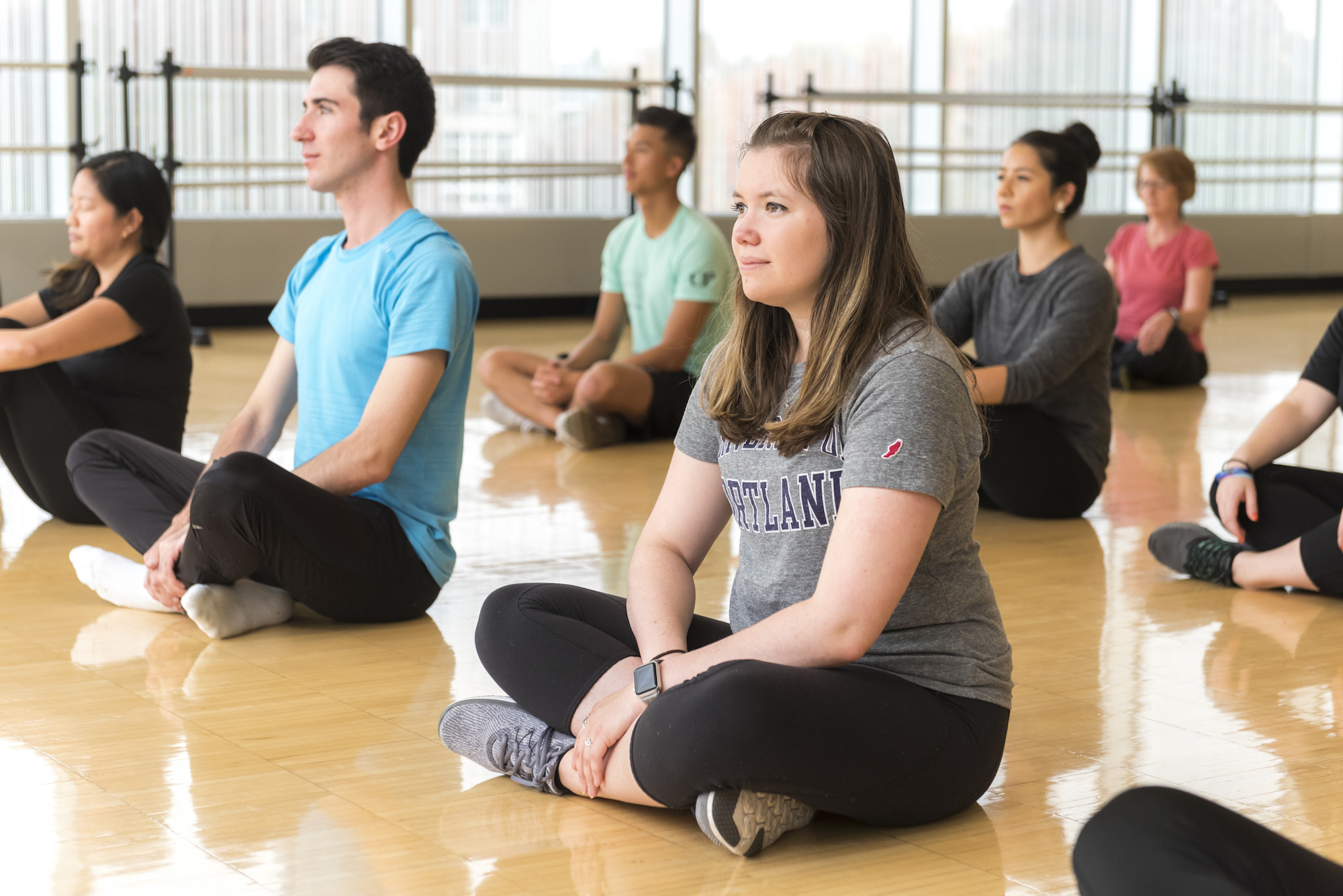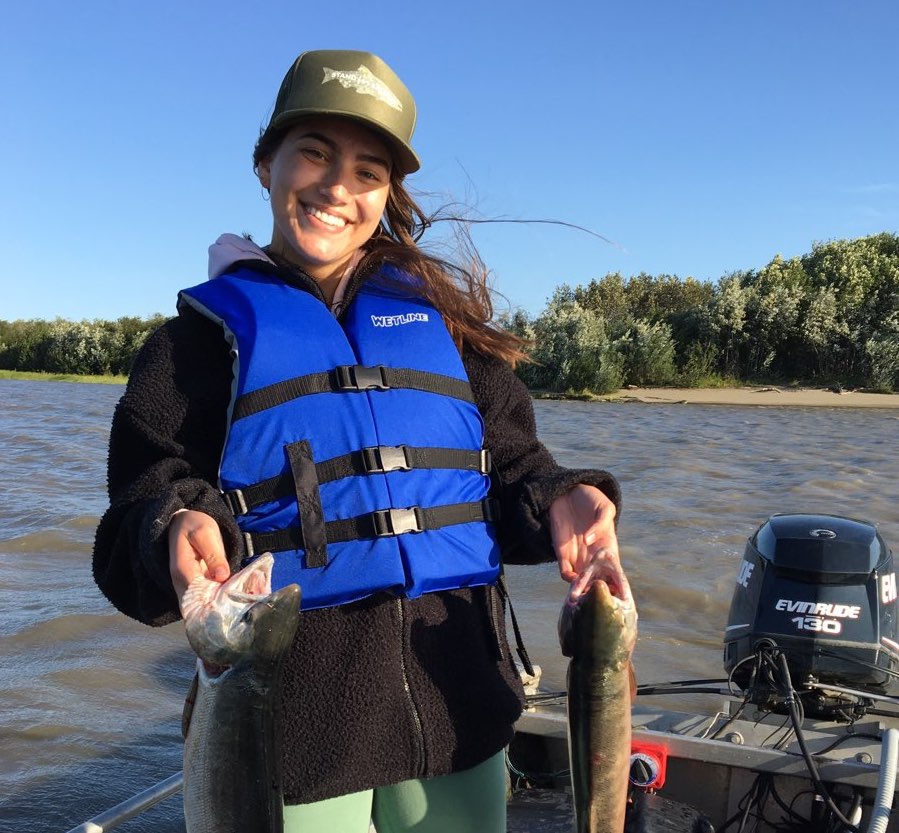

"Fishing is essential to the Yup'ik culture and life in SW Alaska. The Yup'ik people have a deep respect for fish and wildlife and believe that animals give themselves to people for nourishment. Traditionally, meals are eaten in silence out of deep respect for the animals that give themselves to us. I found this true even among college students. It is truly a remarkable culture" - Cathryn Casey
Upon Cathryn Casey’s graduation in May 2019, she joined the Jesuit Volunteer Corps Northwest (JVCNW) as a wellness coordinator in rural Bethel, Alaska for a year of service. The city of Bethel has a population of about 6,000 people and can only be accessed through plane or boat. Bethel is on the Kuskokwim River and is home to the Yup’ik people - the traditional stewards of the land. Cathryn provided wellness activities, tutoring, and mentoring to students at the University of Alaska Fairbanks Kuskokwim Campus.
The four core values of JVC Northwest are: community, solidarity, spirituality, and social & ecological justice. Because of these values and their commitment, Cathryn lived in a house with five other volunteers with no internet and no car. Their mode of transportation to and from work was on foot and their service sites were 2 miles from their home. They traversed the tundra, walking on a rickety boardwalk to get across town. And with the right windstorm, they would also lose phone service for some time. Coming from the suburbs, Cathryn experienced a different lifestyle in a remote, rural city. Key takeaways from her experience were the importance of relationships and building community. In addition, she grew a deeper respect for the land and living with the land, including a deeper sense of gratitude for food. “You really rely on one another when you are living in a rural and remote place.”
Cathryn recalls learning about social determinants of health in her nursing courses and experienced it first-hand living in rural America. Access to health care is challenging with limited providers and access to the internet is incredibly expensive to have in your home. Cathryn also worked with the student government at the college to run a recycling program, which is one of only a few others in town. Most items are thrown away due to a lack of resources to process materials. However, they could recycle aluminum cans and #1 plastics. “We packaged them in bags and shipped them to Anchorage for processing.” Lastly, Cathryn recounts her exposure to extremely cold temperatures in the –40s and -50s. “Sometimes when you’d walk outside, your eyelashes and eyebrows would freeze over. I have developed a much higher cold tolerance and definitely learned the value of wearing layers.”
Climate change is extremely evident in Alaska. She talked with families that have been living there for hundreds of generations and learned that six months of frost used to be the norm, but has now reduced to four months of frost. “Parts of the tundra feel squishy as you walk across because of the melting permafrost underneath.” The JV house had their own struggle with shifting permafrost. For months, the house was tilted 14 inches off level. “When we spilled water, it rushed to one corner of the house. We were in a long line of people waiting to get our houses leveled. It's a perpetual problem in Bethel and there are only so many leveling contractors in town.” Unfortunately, coastal villages are also dealing with warming temperatures, resulting in erosion which has caused some to relocate. For example, village residents of Newtok are relocating to a new village, Mertarvik. In Newtok, encroaching waters have pulled multiple houses into the river because of a lack of protective ice.
Activities during work would include berry picking on the tundra, using the city’s fitness center or going fishing. “I was lucky to eat lots of traditional foods of SW Alaska, like moose, salmon, muskox, seal oil and walrus. And for dessert, akutaq, or ‘Eskimo ice cream’. It’s traditionally made from tundra berries, fish fat, and sugar, all mixed up and served cold. Today a lot of people make it with Crisco if fish fat isn’t available. I’ve had many variations, but my favorite is salmonberry akutaq.” Cathryn states that her experience “meant so much. No words can properly explain or do it justice. It’s a tough but beautiful place to live. I learned so much from Bethel and the people I encountered there. I’m really going to miss it.”
Due to COVID-19, Cathryn’s service ended earlier than expected. However, she is ready for her next adventure. She will be joining the nursing workforce and accepted a job offer at the University of Washington Medical Center (UWMC) in the medical/surgical oncology unit. She is looking forward to getting involved in unit-based council and other leadership opportunities at UWMC. Cathryn firmly believes she received a solid foundation of nursing at the University of Portland and recognizes that the nursing program is well-known across the Pacific Northwest. When speaking with her college peers, they emphasized how well-prepared they felt when entering the nursing workforce. Cathryn hopes to become a charge nurse one day and is open to returning to school in the future to become a nurse practitioner.
University of Portland
5000 N. Willamette Blvd.,
Portland, Oregon 97203-5798
503.943.8000
This website uses cookies to track information for analytics purposes. You can view the full University of Portland privacy policy for more information.
